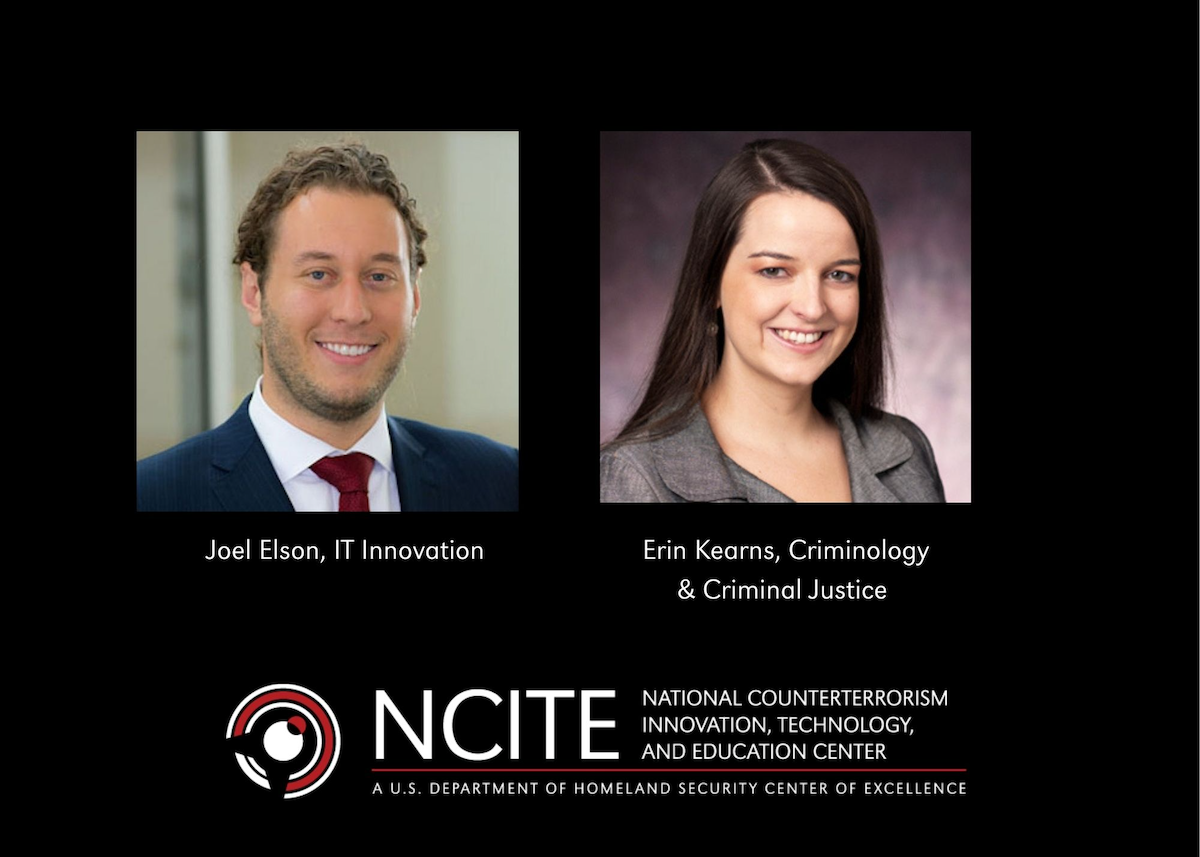NCITE to Study Terrorism Using Chatbots
Researchers from the National Counterterrorism Innovation, Technology, and Education (NCITE) Center have won a $715,102 federal grant to improve suspicious activity identification and reporting using a chatbot.
- published: 2021/10/11
- contact: Erin Grace - NCITE - CCS
- email: egrace@unomaha.edu
- search keywords:
- Homeland Security prevention grant technology

Researchers from the National Counterterrorism Innovation, Technology, and Education (NCITE) Center have won a $715,102 federal grant to improve suspicious activity identification and reporting using a chatbot.
Joel Elson, Ph.D., assistant professor of IT Innovation, and Erin Kearns, Ph.D., assistant professor of criminology and criminal justice at the University of Nebraska at Omaha, are principal investigators of a two-year research project aimed at easing the process of reporting threatening or concerning behavior. They will work with Sarpy County on a project that has potential broad, national application.
“The whole goal of this is preventing a Columbine, a Parkland, a Virginia Tech,” Sarpy County Sheriff’s Captain Kevin Griger said, referring to past mass shootings. “This grant matters because it will help us better understand why and how people are giving tips — why they are not giving tips. Those tips will help us better prevent acts of targeted violence and ultimately keep our 25,000 kids in Sarpy schools safer.”
Despite stepped-up efforts in recent years in tip collecting through programs like the national see-something-say-something campaign, researchers know there are gaps in reporting. People might not know what behavior merits reporting, how or where to report it, and can show reluctance in elevating to law enforcement. A drop in community trust in public institutions contributes to this reluctance.
The whole goal of this is preventing a Columbine, a Parkland, a Virginia Tech
Improving tips reporting processes can build trust and strengthen community resilience to violence, they said.
“We hope our work will contribute to building trust and support efforts to protect innocent lives,” Elson said.
The project has two phases. The first phase seeks to identify what barriers there are to tips reporting and tips processing. In this phase, the NCITE team will conduct a national survey, perform a local study in UNO’s Koraleski Commerce and Applied Behavioral Laboratory, examine archival data and conduct focus groups with threat assessment professionals in Sarpy County, across Nebraska, and nationally. The second phase will develop and test a chatbot to improve tips reporting.
Kearns said the chatbot can ease tensions around reporting by providing a low-level, easy-to-use question-answer feature that is less prohibitive than, say, calling 911.
“People are generally unlikely to want to pick up the phone and call,” Kearns said. “They want a nonthreatening way to have a conversation around terrorism and targeted violence that they then are given the power and control over what do you want to do next above and beyond being forced to do something.”
Elson said people want “a non-intimidating and more natural way” to inquire about suspicious activity or share information.
The NCITE project is one of 37 prevention-oriented research projects that the U.S. Department of Homeland Security selected for awards in its Targeted Violence and Terrorism Prevention Grant Program. The grants, totaling $20 million, were announced last week by the managed by the DHS Center for Prevention Programs and Partnerships or CP3.
DHS Secretary Alejandro N. Mayorkas called domestic violent extremism and targeted violence “significant and persistent threats to our homeland.”
“Attacks on schools, houses of worship, workplaces, and public gatherings threaten Americans’ lives and inflict trauma in our communities,” he said.
This is the first prevention award won by NCITE, a DHS-funded academic center of excellence focused on counterterrorism research.
NCITE is a consortium of 50-plus researchers across 18 academic institutions and is based at UNO. Elson works in the Department of IT Innovation in the College of Information Science and Technology. Kearns works in the School of Criminology and Criminal Justice. Both are NCITE executive committee researchers.